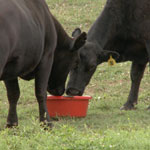 Do you equate a good herd-health program only with a vaccination and/or deworming program? While these are important, they aren’t the only considerations, says Christine B. Navarre, Extension Veterinarian, with Louisiana State university.
Do you equate a good herd-health program only with a vaccination and/or deworming program? While these are important, they aren’t the only considerations, says Christine B. Navarre, Extension Veterinarian, with Louisiana State university.
Dr. Navarre says good overall beef cattle herd health entails the following four basic parts:
1. Nutrition
“The first and most important part of a good herd health program is good nutrition,” says Dr. Navarre. “If adequate nutrition is not provided, deworming, vaccinating and biosecurity practices will fail to make a big impact.”
Cattle need adequate protein, energy, vitamins, minerals and clean water. Not providing these nutrients in the proper amounts will lead to diseases and production losses, according to Dr. Navarre.
“Poor nutrition depresses immunity to diseases and interferes with response to vaccination.” Dr. Navarre says. “Much time and effort can be spent diagnosing, vaccinating for and trying to eliminate a disease, but if nutritional problems aren’t addressed, other diseases will move into a herd.”
2. Deworming
Parasite infestations can cause significant losses in beef herds by depressing weight gains of growing cattle and causing infertility and poor milk production in cows. Parasite infestations also mimic poor nutrition as they rob animals of protein and other nutrients. Like poor nutrition, parasites lower immunity to disease and decrease vaccine responses. A good parasite-control program is an essential part of a successful herd health program, says Dr. Navarre.
3. Vaccinations
Although good nutrition and deworming boost immunity to all diseases, some diseases can overwhelm that immunity and can cause losses even in well-fed and dewormed herds. In these cases, says Dr. Navarre, vaccination programs can help boost immunity to specific diseases, providing extra protection against common diseases.
4. BioSecurity
Even well-fed, dewormed and properly vaccinated herds still have a risk of introducing diseases and suffering losses. that’s why a sound biosecurity plan is needed to help prevent the introduction and spread of diseases in a herd, says Dr. Navarre. “Preventing foreign animal diseases from entering cattle herds is important, but many diseases already here in the united States are costing the beef industry billions of dollars,” she says. “You need to also keep these diseases out of your herds or keep them from spreading if your cattle already have them.”
Source: Purina Checkpoint Newsletter Winter 2010
